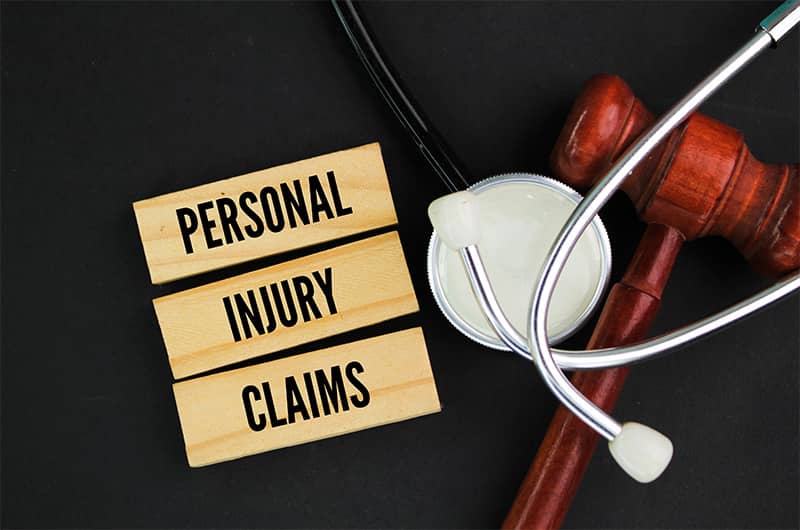What is a Personal Injury Claim?
Your Rights & Options Under Tennessee Law, Explained

Every day, people suffer injuries through no fault of their own – whether it’s a nasty slip and fall at the grocery store, a devastating car crash caused by a reckless driver, or medical complications stemming from a doctor’s negligence. When situations like these occur, and you’re left dealing with medical bills, lost wages, and tremendous pain from preventable harm, you may have grounds to pursue a personal injury claim.
At its core, a personal injury claim holds others financially accountable when their careless conduct directly causes you losses and injuries. It’s a path for recovering fair compensation for damages you never should have suffered in the first place. Personal injury laws aim to make victims “whole” again from an economic standpoint while also providing a measure of justice.
If you or a loved one was recently injured due to another’s negligence, it’s critical to understand your rights and explore filing a legitimate personal injury claim.
Table of Contents
Tennessee Personal Injury Claims 101: Definition and Types
A personal injury claim arises whenever one person (or entity) suffers physical, emotional, or financial harm due to the negligent or intentional actions of another party.
Some common examples of valid personal injury claims include:
- Car accidents caused by distracted, drunk, or reckless drivers
- Slip and fall injuries due to hazardous property conditions
- Injuries from defective products with design or manufacturing flaws
- Medical malpractice and mistakes made during treatment
- Assault, battery, and other intentional acts of violence
- Animal attacks like vicious dog bites
However, every accident doesn’t constitute grounds for a legal claim.
For a legitimate personal injury claim to exist under Tennessee law, you typically need to establish two key factors:
- The other party was negligent and breached their duty of care owed to you, and
- You suffered quantifiable damages like bodily injuries, lost wages, pain/suffering, etc.
The Personal Injury Claim Process
If you’ve been injured by someone’s negligence, the first step is officially notifying them (often through an insurance company) of your intent to seek compensation for your damages and losses. This puts them on notice to preserve evidence.
From there, your personal injury attorney will begin building a case establishing negligence, pinpointing all liable parties, documenting related expenses and hardship, and calculating appropriate damages.
Key evidence gathered typically includes:
- Accident reports and scene documentation (photos, videos, etc.)
- Medical records and bills detailing the full scope of your injuries
- Expert analysis from medical and occupational specialists
- Documented proof of lost wages/earnings and diminished future income
- Witness statements and other sources to prove liability
This case file is then used as leverage by your injury lawyer during settlement negotiations with the defendant’s insurance company or attorneys. The majority of personal injury cases reach settlements out of court if sufficient evidence exists.
However, if the other side refuses to agree to pay reasonable compensation, the next step is officially filing a personal injury lawsuit. This kicks off the litigation process where your attorney presents the documented negligence and damages before a judge or jury to recover what you’re owed.
Recoverable Damages in Personal Injury Claims
In successful Tennessee personal injury claims, the goal is to receive full compensation, or “make whole,” for all the losses, expenses, and hardships you’ve been forced to endure. Compensatory damages awarded generally cover two main categories:
Economic Damages:
- Medical costs (surgeries, hospital stays, doctor visits, rehab, medications, equipment)
- Lost wages/income during recovery and any diminished future earnings
- Property damage repair or replacement costs
- Home modification expenses for disabilities
- And any other out-of-pocket financial impacts
Non-Economic Damages:
- Pain and suffering
- Emotional distress, PTSD, anxiety
- Loss of enjoyment of life
- Permanent disfigurement or disability
- Loss of consortium (companionship) for spouses
In cases involving egregiously negligent or intentionally harmful conduct, Tennessee courts may also award punitive damages designed to punish the defendant and deter similar behavior.
Determining Liability and Establishing Negligence in Personal Injury Cases
At the heart of virtually all personal injury cases lies the concept of negligence – when one party breaches their duty of care, resulting in injuries to another person. To recover compensation, your attorney must establish four distinct elements:
- The defendant owed you a reasonable duty of care in that specific situation.
- They failed to uphold that duty through negligent actions or inactions (the breach).
- You suffered legitimate damages in the form of injuries or losses.
- The defendant’s breach of duty was the direct and proximate cause of those damages.
Tennessee operates under a “modified comparative negligence” model, meaning you can still potentially recover damages if you are less than 50% at fault. Your award would just be reduced by an amount equal to your percentage of liability.
Hiring a Personal Injury Attorney
While you have the option to pursue a personal injury claim on your own, the realities of going it alone are quite challenging. These cases tend to involve legal theories, strict deadlines, combative insurance companies motivated to minimize payouts, and mountains of paperwork.
Retaining an experienced Tennessee personal injury lawyer brings value in the form of:
- Expert understanding of state laws, legal requirements, and court procedures
- Skilled negotiators used to maximizing settlement values
- Access to expert witnesses, specialists, and other litigation resources
- Handling all the tedious legal busywork so you can focus on recovering
- Contingency fees meaning you pay nothing upfront – we’re compensated as a percentage of your total award
In our experience, clients who hire reputable personal injury counsel consistently recover far more compensation compared to self-representing. We advocate aggressively.
Time Limits for Filing a Personal Injury Lawsuit
It’s important to note that if settlement efforts fail, Tennessee has strict time limits known as the statute of limitations for getting your personal injury lawsuit officially filed and on the court docket. In most cases, the deadline for most personal injury and negligence claims is one year from the date of injury.
There are some potential exceptions or extensions to these windows, such as if the victim was a minor child or mentally incapacitated at the time. But in general, if you miss these statute of limitation deadlines, the court will likely dismiss your case regardless of merit.
How to Initiate a Personal Injury Claim in Tennessee
So, if you’ve been injured due to another party’s negligent or wrongful conduct, what should your first steps be? Here are a few quick tips:
- Seek proper medical attention and follow all treatment instructions, even if you think injuries are minor
- Document everything to the best of your ability: take photos/videos, get witness contact info, request copies of accident reports/records, etc.
- Avoid potentially damaging actions like providing recorded statements, posting on social media about the incident, or accusations of fault
- Contact an injury attorney in your area for a free claim evaluation. Reputable firms offer no-obligation case reviews upfront, so take advantage.
During the free consultation, we’ll listen intently to the details of your situation, examine the evidence, explain all your legal options moving forward, and map out the next steps for seeking rightful compensation.
Ultimately, deciding whether pursuing a personal injury claim is worthwhile comes down to the specifics surrounding your injuries, damages incurred, ability to establish negligence liability, and the potential settlement value.
With proper guidance from the start, you’ll be empowered to make the best possible decision for your circumstances.
If you’ve suffered injuries in Tennessee and another party may be at fault, don’t wait to seek justice. Contact The Higgins Firm today. Our team is here to evaluate your case free of charge, advise you of your legal rights, and advocate for the compensation you deserve.




![Average Settlement for Car Accidents in Nashville [What to Expect in 2025]](https://www.thehigginsfirm.com/wp-content/uploads/2025/03/car-accident-settlement.jpg)
